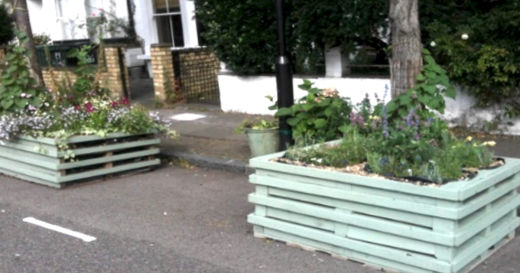Lynne Friedli shares an inspiring idea to convert residential parking spaces into green spaces for fruit, vegetables and flowers.
Author: Lynne Friedli and Helena Farstad
Our thanks to Lynne Friedli for sharing this inspiring proposal to Islington Council. If you have other inspiring ideas or if your neighbourhood has developed a similar idea please share it with us.
This is a proposal to re-purpose a percentage of Islington's residential parking spaces as growing places. Through a simple system of Residential Green Growing Permits, Islington residents could apply to have a planter, rather than a parked car, in designated local parking spaces, adjacent or very close to where they live.
These 'mini allotments' would help to address the very high level of unmet demand among Islington residents for space to garden and provide hands on opportunities for many more families to become involved in growing. They would also expand the proportion of green spaces in the borough, increase access to the natural environment, involve residents, especially children, in enhancing biodiversity and help to achieve cleaner air.
The current pandemic is an urgent reminder of the importance of cleaner, greener local spaces. The challenges of social distancing mean streets must work differently as spaces for people to be and spend time. We will be living much more local lives. The immediate street environment matters more. Turning parking spaces into growing places would help to transform Islington streets into spaces where people and nature can flourish, part of rebalancing our streets to meet health, well-being and quality of life needs.
We also know it works! In Mayton Street, N7, a single parking space has been successfully re-purposed as a growing space for nearly a year. The parking space has two 1.10m square planters, placed 1.5m apart. Planted with flowers and herbs, with a focus on bee forage, the planters are maintained by two adjacent households (22 and 24 Mayton Street).
Every car journey begins and ends with a parking space. Reducing parking spaces is a crucial element of tackling the transport gridlock that London, and Islington, are facing post lockdown.

Mayton Street planters
The publisher is the Centre for Welfare Reform.
Re-imagining Our Streets © Lynne Friedli 2020.
All Rights Reserved. No part of this paper may be reproduced in any form without permission from the publisher except for the quotation of brief passages in reviews.
nature & economics, Neighbourhood Democracy, Sustainability, England, Article